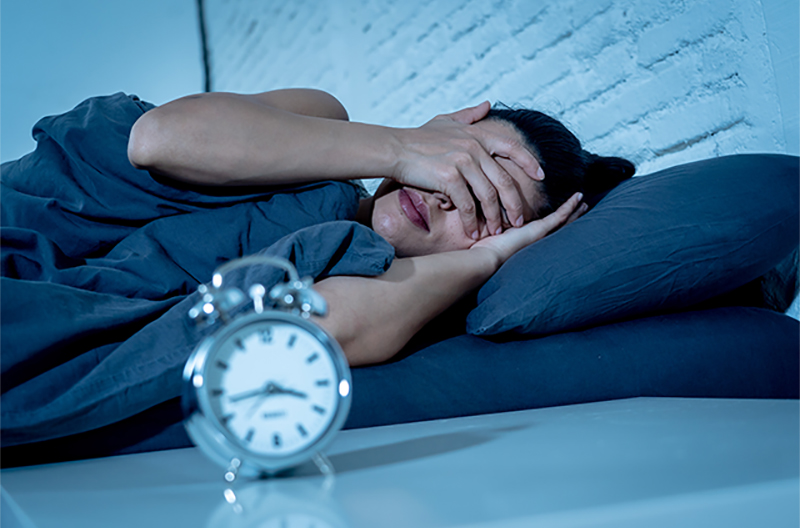You can barely keep your eyes open. You’re staring at your computer screen but all you can think about is sleep. You feel irritated, tired, and can hardly concentrate. But you have to; you have to get through the day. If this scenario sounds familiar to you, it may be indicative of an underlying health condition. You could actually be suffering from one of the most common types of sleep disorders.
While that may sound like no big deal, if you’re not getting the rest you need at night, it can have serious implications for your wellness. What’s more, if you ignore this problem, there’s a chance that it could get worse over time. Here’s what you need to know about sleep disorders, the most common symptoms, and what you need to do next.
What Are Sleep Disorders?
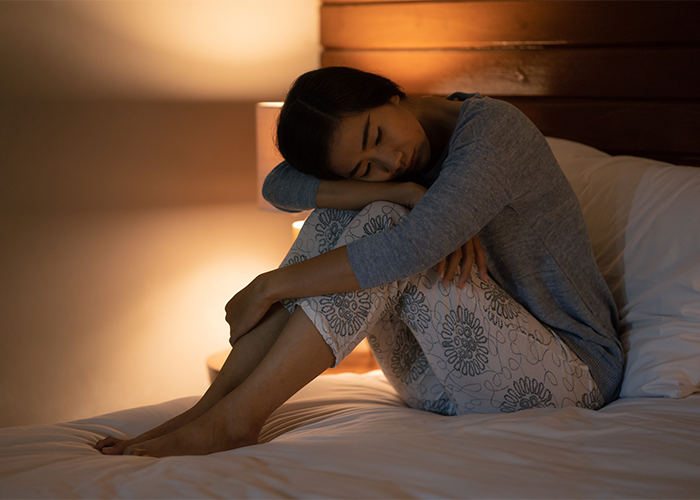
Do you know about the main types of sleep disorders? As the name suggests, these are health-related problems that affect you when you’re asleep or, indeed, trying to sleep. Adults should get between seven and nine hours sleep per night, according to the NHS.[1] If you regularly get less than that amount of sleep, it could well be cause for concern.
Failing to get the rest that you need each night can lead to catastrophic problems with your general health. In fact, in the long term, sleepless nights can lead to obesity, heart disease, and diabetes.[2] Needless to say, all of the above illnesses can shorten your lifespan dramatically. Doing something about any sleep disorders you may have is a wise move.
There are actually many different types of disorders out there — from sleep apnea to insomnia — which is why it’s important that you educate yourself. With that in mind, taking a look at a list of sleep disorders and their symptoms could be the right way forward. That way, you can identify whether you may have a problem and figure out if you need to see a doctor. The more you know about the topic, the better you can protect yourself.
Did you know you that experts suggest that you should be getting between seven and nine hours of sleep per night?[3]
5 General Sleep Disorder Symptoms to Look Out For
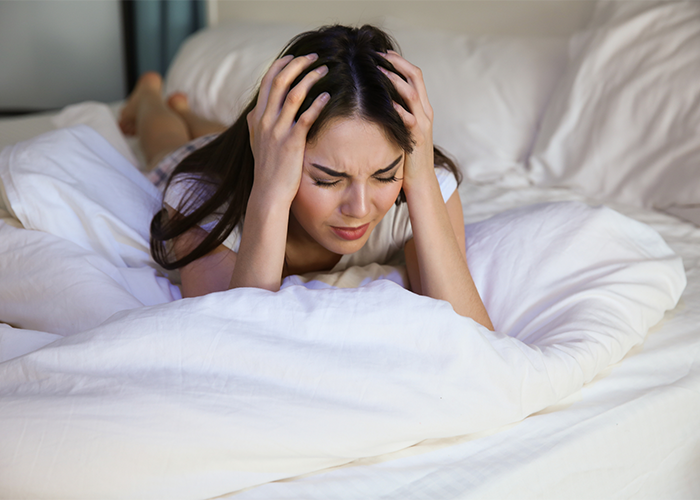
Trouble getting a decent amount of kip each night? You’re not alone. Between 50 and 70 million Americans have some type of sleep disorder, according to the American Sleep Association.[4] If you think that you may be suffering from one of the types of sleep disorders, there are some tell-tale signs to look out for.
While each condition will have a different list of sleep disorder symptoms, it’s worth knowing about the most prevalent ones. That way, you will have the chance to treat the issue as soon as possible. Let’s face it, doing so could be a major step forward when it comes to your overall well-being! Here are five of the signs that many of the sleep disorders we will look at shortly have in common.
- Lack of sleep at night
- Fatigue and tiredness
- Irritability
- Trouble concentrating
- Waking up at night
Do you experience these particular sleep disorder symptoms? If so, it’s worth taking a deeper look at the issue to see whether you are struggling with a condition. Don’t panic. Should you identify that you have a sleep disorder, your doctor will be able to help you along the way when it comes to managing it. The more you understand your disorder, the more you will be able to do about it. You don’t need to suffer in silence.
Pro tip: Studies have shown that essential oils for sleep can help you fall asleep.
A List of Sleep Disorders: Types of Sleep Disorders, Symptoms & Treatment
Now that you understand the basics, it’s time to look at some of the major types of sleep disorders and how they may affect you. When you’re not getting enough rest each night, doing all you can to understand the cause is the smartest thing you can do for your health. Take a moment to look over the following list of sleep disorders and see if any of the symptoms sound familiar. If they do, getting some medical help and advice is vital.
Insomnia
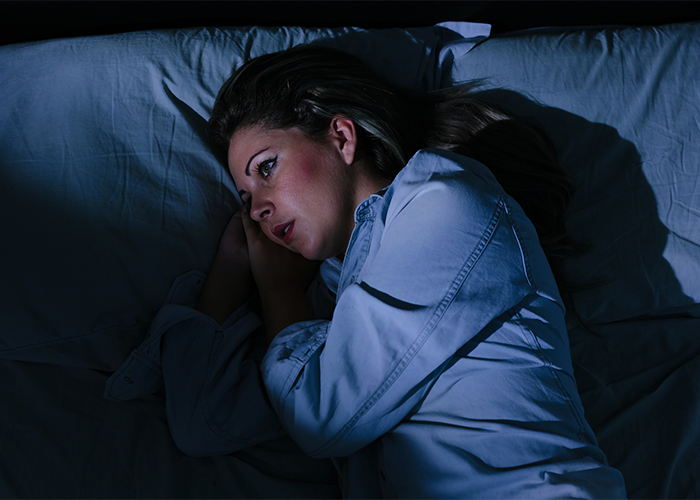
What is it?
Insomnia is one of the most well-known sleep disorders. The problem regularly stops people sleeping, which can lead to further problems later down the line.[5] Insomnia is often linked to disorders including anxiety and depression, according to a report in the US National Library of Medicine.[6] If you believe that you are suffering from insomnia, addressing some of these issues could be the answer.
Symptoms
- Difficulty sleeping
- Waking up during the night
- Waking up extra early
- Tiredness in the day
- Irritability
- Difficulty concentrating
Treatment
If you are struggling with the above sleep disorder symptoms, it’s time to take action. The Sleep Foundation advises that there are ways in which you can treat insomnia at home.[7] Here are some of the ways in which the experts suggest approaching the issue:
- Mindfulness and relaxation
- Stimulus control (i.e. limiting too much activity before bed)
- Breathing exercises
Failing the above methods, the Sleep Foundation also recommends Cognitive Behavioral Therapy (CBT), which may help you to handle the issue.[8] Seeing a physician is the first step in getting the help you need. They will give you advice on what to do next when it comes to this sleep disorder.
Narcolepsy

What is it?
Only one in every 2000 people in the US suffer from narcolepsy.[9] Unlike other types of sleep disorders, this one is a long-term brain disorder. Sufferers’ brains lack the ability to regulate their sleeping patterns. This can lead to people falling asleep during the day or waking regularly throughout the night. The two main symptoms are irregular sleep and wake patterns along with REM intrusion.[10] However, these may manifest in a variety of ways.
Symptoms
- Suddenly falling asleep
- Temporary loss of muscle control
- Sleep paralysis
- Daytime sleepiness
- Waking during the night
- Hallucinations
Treatment
Treatments include medication, therapy, and lifestyle changes.[11] However, each case is unique and the treatment you need will depend entirely on your condition. Make sure that you see a physician who is trained and certified in Sleep Medicine and board certified in Neurology too.
Did you know narcolepsy affects one in every 2000 Americans?[12]
Obstructive Sleep Apnea (OSA)
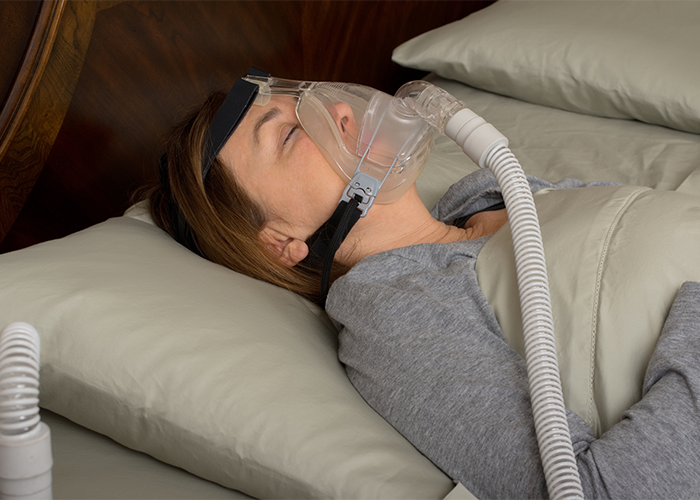
What is it?
When we’re looking at types of sleep disorders, we shouldn’t overlook this one. Obstructive sleep apnea is quite a common problem, in which a person frequently stops breathing during the night and also snores loudly.[13] The issue often prevents people from getting the right level of sleep. The condition is not life-threatening.[14] However, it is worth getting some help should you find that it disrupts your lifestyle.
Symptoms
- Loud snoring
- Interrupted breathing
- Gasping and snorting
- Difficulty breathing
Treatment
OSA is one of the types of sleep disorders that is completely treatable. One way in which you can face the problem is by making lifestyle changes, such as losing weight.[15] Your doctor may also advise you to continuous positive airway pressure (CPAP) device which will help keep your airways open as you sleep.[16] In some cases, you may also find that this disorder can be treated using surgery.
Hypersomnia

What is it?
Put simply, hypersomnia is the name given to daytime sleepiness and sleeping; a condition which affects 4-6% of people.[17] When people are suffering from sleep disorders like this one, they will find that they are tired throughout the day, regardless of the amount of rest they get at night. Of course, when you’re struggling with this issue, it can impact your daily life in a highly negative way.
Symptoms
- Falling asleep during the day
- Excessive tiredness
Treatment
Should you find that you have these sleep disorder symptoms, there is a chance that you are affected by hypersomnia. You should see a doctor and talk to them about the issue. Your physician may use therapy and medication to help you deal with this complaint.[18] You might also find that your doctor refers you to a specialist.
Circadian Rhythm Disorders

What are they?
Circadian rhythm disorders is an umbrella term for a whole range of types of sleep disorders. Your circadian rhythm is your internal body clock, which is responsible for your 24-hour cycle of biological processes.[19] When you have a problem with your circadian rhythms, it affects your sleep patterns and can make you tired during the day.
Symptoms
- Disruption in sleep patterns
- Excessive sleepiness
Treatment
Since there are many different types of sleep disorders encompassed in this particular term, the treatment varies.[20] The first step is to see your doctor and determine which type of disorder you have. Then the medical professional will be able to give you advice and support to help you sure or manage the condition.
Non-24-Hour Sleep-Wake Rhythm
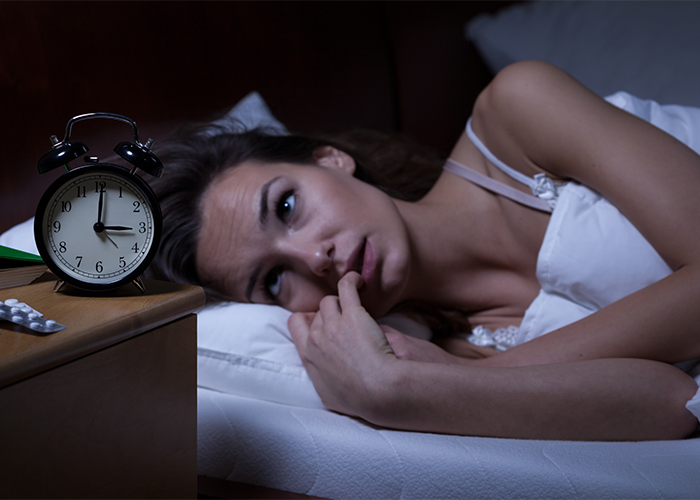
What is it?
The Non-24-Hour Sleep-Wake Rhythm is one of the many Circadian Rhythm Disorders. It occurs when a person’s sleep pattern does not follow the normal 24-hour cycle.[21] Each day, a sufferer’s cycle will shift a little forward. That means that the time at which a person falls asleep each night will depend on where they currently are in their cycle. More than half of blind people have this condition.[22] Other causes may be dementia and brain injury.
Symptoms
- Falls asleep later and later each night
- Wakes up later and later each day
- Sleep pattern moves around
Treatment
If the above sleep disorder symptoms sound familiar, the sooner you see a doctor, the better. They will be able to give you a formal diagnosis. For those who are not blind, a form of light treatment may be an option for this disorder. On the other hand, blind sufferers may use timed melatonin supplements to help reset their body clock.[23]
Periodic Limb Movement Disorder (PLMD)
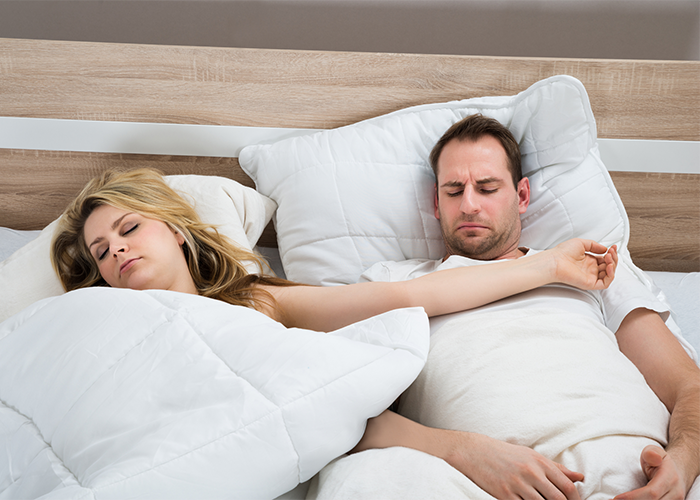
What is it?
As you might imagine, Periodic Limb Movement Disorder (PLMD) is a condition that causes your limbs to move unexpectedly during sleep.[24] According to the National Sleep Foundation, this particular condition tends to affect mainly the lower limbs and can occur every 20-40 seconds.[25] Experts theorize that the underlying reason for this disorder could be associated with the nervous system. However, more research is needed to determine whether or not this is the case.
Symptoms
- Regular limb movements when sleeping
- Uncomfortable sensation in limbs
- Tiredness caused by waking at night
Treatment
If you are experiencing these sleep disorder symptoms and believe that you have PLMD, you should see a doctor. It may be that there is no need for medication if the disorder does not affect other areas of your life. On the flip side of that, if you find that you suffer from fatigue and insomnia as a result of the disorder, your doctor may prescribe you a form of medication that will help manage the problem.[26]
Shift Work Sleep Disorder
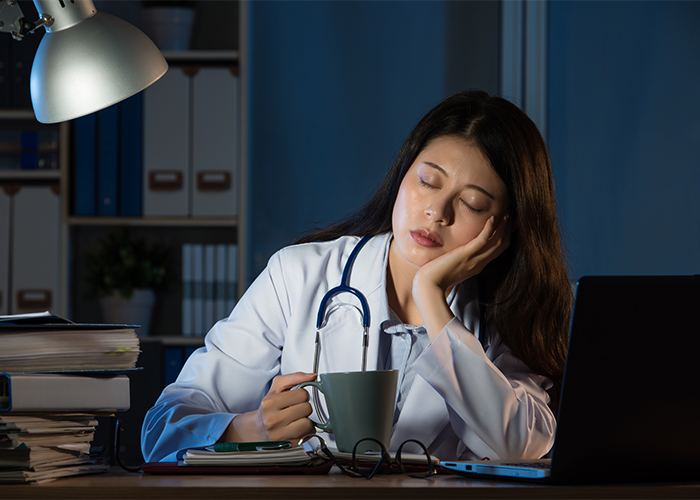
What is it?
Working shifts can be detrimental to a person’s work-life balance and overall well-being. Typically, shift work can cause people to get less than 7-9 hours sleep per night which may lead to health concerns down the line. The Shift Work Sleep Disorder causes some worrying symptoms that can affect a person’s everyday life in a highly negative way.[27] In some instances, this can even lead to chronic sleep deprivation.
Symptoms
- Sleepiness when you should be awake
- Trouble concentrating
- Low energy
- Irritability
- Depression
- Insomnia
- Feeling unrefreshed after sleep
- Trouble with personal relationships
Treatment
Of course, since the cause of these sleep disorders is shift work, the obvious way to solve the problem is to change your job and lifestyle. However, that is not always possible. The National Sleep Foundation recommends taking regular naps during the shift or breaks could be one way to manage the problem.[28] Long-term shift-work can be detrimental to your health. For that reason, you may want to look for ways in which you can avoid it.
Parasomnias
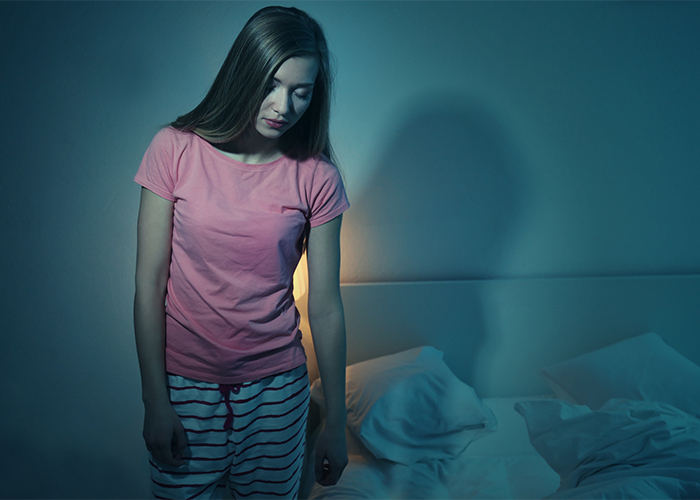
What are they?
Parasomnias is another umbrella term, which is given to abnormal sleep disorders that happen during the evening except for apnea.[29] These conditions affect around 10% of Americans.[30] Examples include sleepwalking, eating while asleep, nightmares, sleep paralysis, and sleep aggression. In short, these are disorders that cause people to do things while they are asleep of which they may not be aware at all. These types of sleep disorder can have negative effects, such as fatigue throughout the day.
Symptoms
- Sleepiness in the day
- Waking at night
- Abnormal nighttime behavior
Treatment
When someone is having a parasomnia episode, the worst thing that a person can do is try to wake them up. Doing so could mean that the sufferer has an unexpected violent outburst.[31] Instead, the person should be redirected to the safety of their bed.
If you believe that you suffer from one of the common forms of parasomnia, changing your sleep habits could be one way to cope with the issue. For example, you might find that minimizing stress, relaxing before bedtime, and getting more sleep help to decrease the number of episodes you suffer.[32] Should you find that the sleep disorder symptoms are hindering your lifestyle in a serious way, you may want to see a physician.
Did you know that it’s dangerous to wake someone when they’re sleepwalking?[33]
Catathrenia
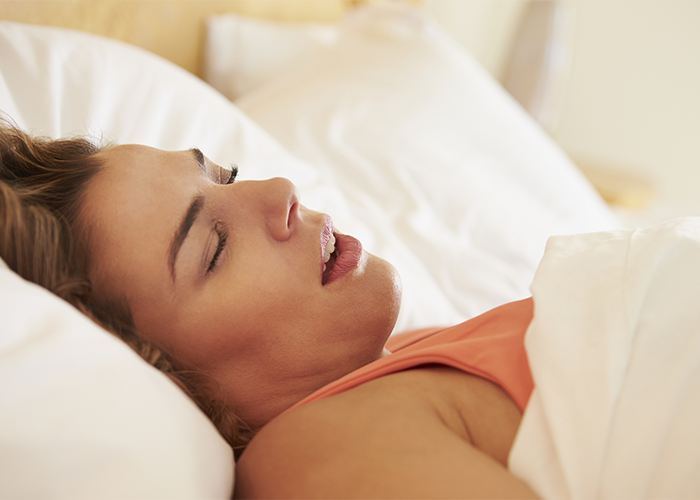
What is it?
Catathrenia is the official term for sleep groaning. The condition is quite a rare one and sees sufferers groan at regular intervals while they are asleep.[34] Most people who are affected by these types of sleep disorders have nightly bouts of the symptoms. The groans may be accompanied by other noises including sighs and snorts. Experts believe that groaning takes place during the rapid eye movement (REM) stage of sleep.[35]
Symptoms
- Regular groaning when asleep
- Sighing
- Snorting
- Tossing and turning
Treatment
Much of the time, catathrenia will not affect a person’s quality of sleep too much. However it could prevent their partner from getting rest or even sleeping during the night. If that is the case, you may want to seek medical attention for the condition. You could see whether there is a sleep clinic in which you can take part to find out more about the issue. Speak to a physician about the matter and take their advice on what to do next.
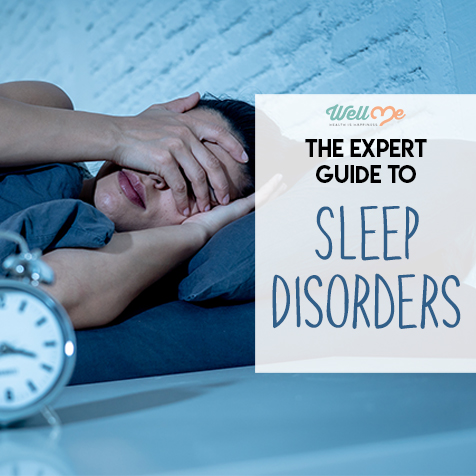
Conclusion
Are you ready to revamp your sleeping habits and tackle the problem head-on? This guide should have given you an in-depth overview of the many types of sleep disorders out there. Now that you have an understanding of what each condition entails and how you can treat it, you have all the information you need to beat it. Booking an appointment with your family physician or doctor is likely the next step.
When you see an expert about the problem, they will have the chance to run proper tests and give you a full diagnosis. As we have covered, many of the most common sleep disorders can be managed and tackled with simple lifestyle changes. However, if the condition is more serious, you may find that there are medical and surgical treatments available to you. What are you waiting for? Go ahead and talk to an expert today!
References
- [1] https://www.nhs.uk/conditions/insomnia
- [2] https://www.nhs.uk/live-well/sleep-and-tiredness/why-lack-of-sleep-is-bad-for-your-health
- [3] https://www.nhs.uk/conditions/insomnia
- [4] https://www.sleepassociation.org/about-sleep/sleep-statistics
- [5] https://www.nhs.uk/conditions/insomnia
- [6] https://www.ncbi.nlm.nih.gov/pmc/articles/PMC1978319
- [7] https://www.sleepfoundation.org/insomnia/treatment
- [8] https://www.sleepfoundation.org/insomnia/treatment
- [9] https://narcolepsynetwork.org/about-narcolepsy/narcolepsy-fast-facts
- [10] https://narcolepsynetwork.org/about-narcolepsy/treatment
- [11] https://narcolepsynetwork.org/about-narcolepsy/treatment
- [12] https://narcolepsynetwork.org/about-narcolepsy/narcolepsy-fast-facts
- [13] https://www.who.int/respiratory/other/Obstructive_sleep_apnoea_syndrome/en
- [14] https://www.who.int/respiratory/other/Obstructive_sleep_apnoea_syndrome/en/
- [15] https://www.nhs.uk/conditions/obstructive-sleep-apnoea
- [16] https://www.nhs.uk/conditions/obstructive-sleep-apnoea
- [17] https://www.ncbi.nlm.nih.gov/pmc/articles/PMC3181743
- [18] https://www.ncbi.nlm.nih.gov/pmc/articles/PMC3181743
- [19] https://my.clevelandclinic.org/health/diseases/12115-circadian-rhythm-disorders
- [20] https://my.clevelandclinic.org/health/diseases/12115-circadian-rhythm-disorders/management-and-treatment
- [21] http://sleepeducation.org/sleep-disorders-by-category/circadian-rhythm-disorders/non-24-hour-sleep-wake-rhythm
- [22] http://sleepeducation.org/sleep-disorders-by-category/circadian-rhythm-disorders/non-24-hour-sleep-wake-rhythm
- [23] http://sleepeducation.org/sleep-disorders-by-category/circadian-rhythm-disorders/non-24-hour-sleep-wake-rhythm/diagnosis-treatment
- [24] https://www.sleepfoundation.org/articles/periodic-limb-movements-disorder
- [25] https://www.sleepfoundation.org/articles/periodic-limb-movements-disorder
- [26] https://www.sleepfoundation.org/articles/periodic-limb-movements-disorder
- [27] https://www.sleepfoundation.org/shift-work-disorder/what-shift-work-disorder/shift-work-disorder-symptoms
- [28] https://www.sleepfoundation.org/shift-work-disorder/what-shift-work-disorder/shift-work-disorder-symptoms
- [29] https://www.sleepfoundation.org/articles/sleep-and-parasomnias
- [30] https://www.sleepfoundation.org/articles/sleep-and-parasomnias
- [31] https://www.sleepfoundation.org/articles/sleep-and-parasomnias
- [32] https://www.sleepfoundation.org/articles/sleep-and-parasomnias
- [33] https://www.sleepfoundation.org/articles/sleep-and-parasomnias
- [34] https://www.sleepassociation.org/sleep-disorders/more-sleep-disorders/catathrenia
- [35] https://www.sleepassociation.org/sleep-disorders/more-sleep-disorders/catathrenia

